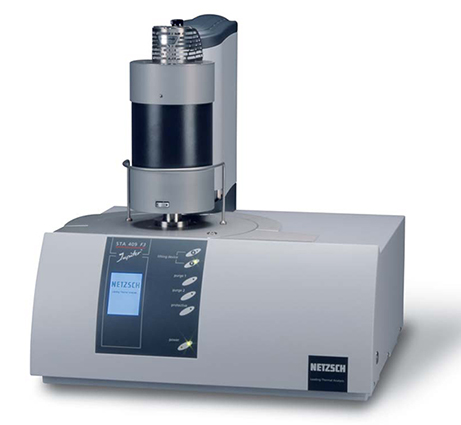Equipment: TGA-DSC – Simultaneous Thermal Analyser_Netsch STA 449 F3 Jupiter
Technique: Thermal Analysis
Contact person (UNINOVA): Pedro Barquinha (pmcb@fct.unl.pt), Ana Rovisco (a.rovisco@fct.unl.pt)
Responsible: Ana Pimentel / acgp@fct.unl.pt
Description: An instrument for determining caloric effects (transformation temperatures and enthalpies) and mass change at the same time.
Specifications:
DSC (Differential Scanning Calorimetry) Features:
Determination of onset, peak, inflection and end temperatures; automatic peak search; transformation enthalpies; comprehensive glass transition analysis; automatic baseline correction; degree of cristallinity; O.I.T (oxidative induction time) evaluation
TG (Thermogravimetry) Features:
Mass changes in % or mg; automatic evaluation of mass change steps; determination of the residual mass; extrapolated onset and end set; peak temperatures of the 1st and 2nd derivates of the mass change curves; automatic baseline correction.
- Temperature: 0-1550°C (0.001 K resolution)
- Heating rate · 0.001-50 K/min (furnace-dependent)
- Balance resolution 0.1 μg (over the entire weighing range)
- Balance drift < 5 μg/hour
- Maximum sample load 35000 mg (incl. crucible)
- DSC enthalpy accuracy 1% (for indium).
- Only non-corrosive samples can be analysed in this very sensitive instrument. No organic or other materials containing F, Cl, Br.
- Pans of Al, Pt/Rh and, alumina are available
- Atmospheres: nitrogen and air
- Sample size: from 0.5mg
Link for additional information: STA_449_F3_Jupiter
